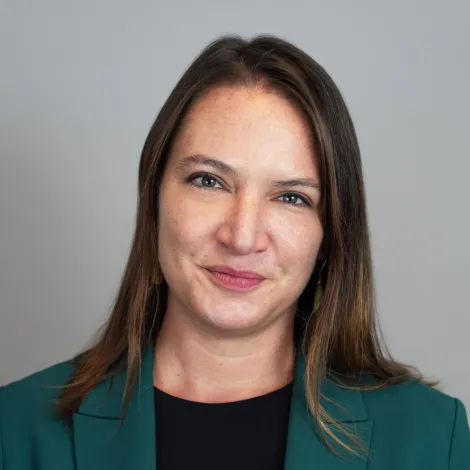Course 1 of 6
Explore leadership frameworks, reflect on personal strengths, and identify opportunities for growth to become a more effective, high-impact leader.

As Chief Executive Officer of the Center to Advance Palliative Care (CAPC), Brynn Bowman presides over the organizational and content strategy that serves more than 1,700 CAPC member health care organizations, including over 70,000 clinicians and administrators. Ms. Bowman, previously CAPC Chief Strategy Officer, succeeds Diane E. Meier, MD.
Ms. Bowman is a nationally recognized leader in scaling practice and culture change in health care delivery for people with serious illness. An expert in palliative care education, she specializes in health care leadership; palliative care business and financing; palliative care program design; palliative care education for nonpalliative care specialists; and palliative care delivery during the COVID-19 pandemic. Her work has been instrumental in the development of clinician engagement and education strategies to equip the U.S. health care workforce with the skills needed to care for patients with serious illness, and their families.
Ms. Bowman was a 2020/2021 Health and Aging Policy Fellow, where she served with the Senate Finance Committee. She has co-chaired three of the National Academies of Sciences, Engineering, and Medicine (NASEM) Roundtable on Quality Care for People with Serious Illness workshops focused on workforce and the impact of the COVID-19 pandemic. In 2016, she won the Brandon Hall Group Silver Excellence in Learning Award for Best Use of Mobile Learning: CAPC Online Curriculum.
Ms. Bowman has served on a number of advisory groups, including the C-TAC Summit Development Committee and Moonshot; the Stakeholder Advisory Committee of the American College of Surgeons Geriatric Surgery Verification Program; Aquifer palliative care curriculum development for medical students; and the Serious Illness Care Program Implementation Collaborative. In 2018–19, Ms. Bowman led a consensus process to grow the field of pediatric palliative care that codified a road map of priority actions and led to the development of a national coordinating pediatric palliative care task force. In 2021-22, Ms. Bowman was co-investigator for CAPC’s health equity initiative to identify opportunities to improve the quality of care for Black patients with serious illness.
Ms. Bowman has characterized palliative care clinical education for nonpalliative care specialists in multiple peer-reviewed publications, including Health Affairs, the Journal of Palliative Medicine, and the Journal of the American Geriatrics Society, among others. She has coauthored multiple CAPC publications, including Palliative Care in the Home: A Guide to Program Design (2016) and The Case for Communication Skills Training.
Formerly vice president of education at CAPC, Ms. Bowman was responsible for developing CAPC’s online clinical training curriculum and a wide range of technical assistance that has garnered nearly a million course completions by one hundred thousand clinicians nationwide.
Prior to joining CAPC in 2013, Ms. Bowman served as strategy director at LevelUp, a technology company specializing in mobile payment and small-business marketing. Ms. Bowman graduated from Harvard College in 2008 with an AB in biological studies and received her MPA from New York University in 2017.
Brynn Bowman lives in New York City.
CAPC CEO, Brynn Bowman, MPA, discusses the challenges of today’s health care landscape and shares four strategies to help palliative care leaders navigate uncertainty and safeguard quality care.
All about the challenges and benefits of age diversity on health care teams—plus four key principles for leading multigenerational teams successfully.
A follow-up to December’s briefing, including thoughts and comments from the field, and more.
Course 1 of 6
Explore leadership frameworks, reflect on personal strengths, and identify opportunities for growth to become a more effective, high-impact leader.
Course 2 of 6
Learn practical communication skills—from active listening to managing difficult conversations—that build trust, strengthen teams, and enhance leadership impact.
Course 3 of 6
Explore how emotionally intelligent leadership builds trust, psychological safety, and collaboration to create high-performing health care teams.
Course 4 of 6
Build resilience and grit as a leader, using positive intelligence to overcome challenges, foster growth, and strengthen team productivity.
Course 5 of 6
Learn how to design inclusive, efficient workplaces that empower teams to contribute their unique strengths.
Course 6 of 6
Equip yourself with strategies to cultivate mission-driven, resilient teams and foster a work culture where staff thrive
Course 1 of 6
Understand how Medicare, Medicaid, and private payers share responsibility for health care costs, and the financial impact on patients and families.
Course 2 of 6
Examine what Medicare does and doesn't cover, while exploring the rise of Medicare Advantage and its impact on patients and providers.
Course 3 of 6
Learn how Medicaid and VA benefits support vulnerable patients and families needing palliative care, and who qualifies for these programs.
Course 4 of 6
Explore how fee-for-service payment works, its impact on quality, and strategies to optimize both revenue and performance under this model.
Course 5 of 6
Learn how value-based payment models tie quality to cost, and explore strategies for balancing priorities when navigating both fee-for-service and value-based care.
Course 6 of 6
Examine the rise of for-profit health care, why investors are drawn to the field, and the impact of profit incentives on care delivery.
Course 1 of 6
Develop systems-thinking skills to assess situations, engage key stakeholders, and strategically prioritize resources for effective leadership.
Course 2 of 6
Learn to strategically plan service expansion by conducting discovery, testing data-driven ideas, and engaging key decision-makers to secure resources.
Course 3 of 6
Learn how to balance planning with flexibility to navigate unplanned changes and maintain team stability.
Course 4 of 6
Learn to optimize staffing, collaborate across teams, and use operational data to improve service delivery and impact.
Course 5 of 6
Gain strategies to expand palliative care across settings and populations through thoughtful planning, partnerships, and collaboration.
Course 6 of 6
Learn to use metrics strategically to build a compelling business case, demonstrate program value, and secure long-term support.